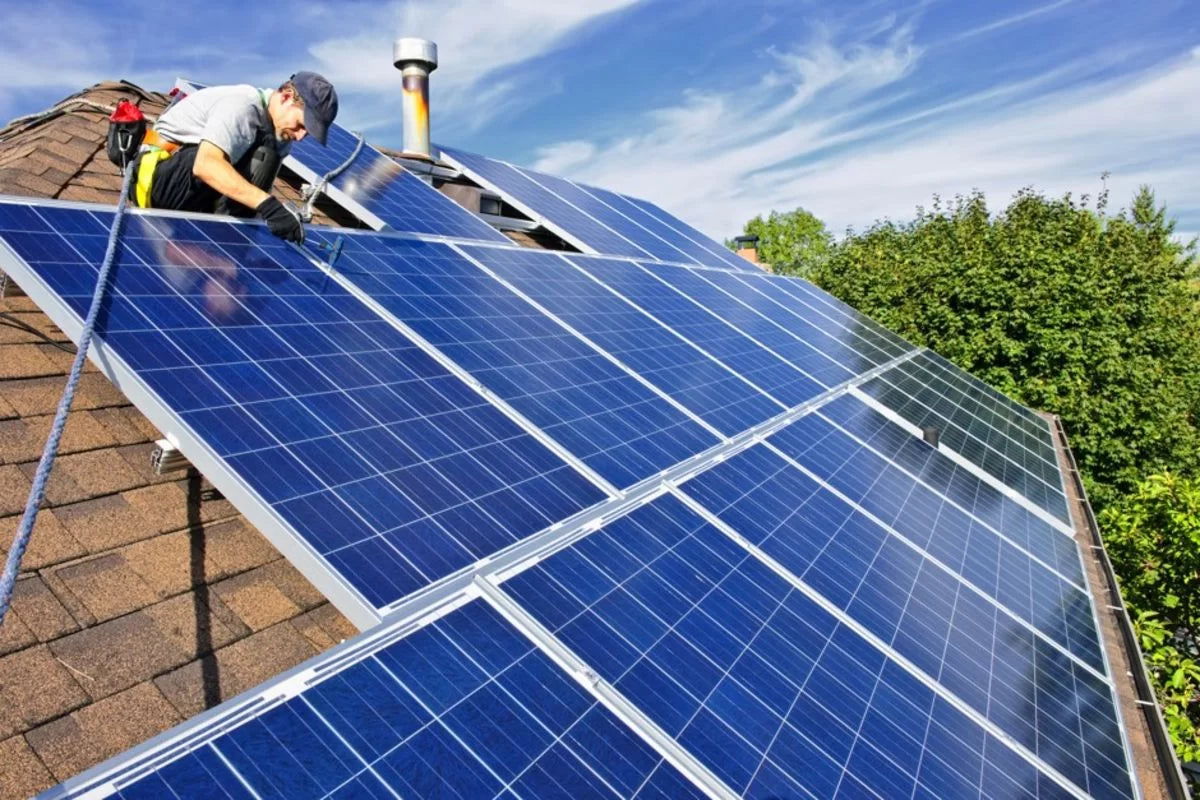
What is the Highest Efficiency Solar Panel?
When considering a solar investment, it’s hard to get past the performance of your home solar panels. Want to compare two solar panels? Efficiency is a measure of how well a solar panel can convert sunlight into usable electricity, and it directly affects the amount of energy that your home or business can generate from limited space on the roof.
If you’ve ever wanted to know what is the most efficient solar panel or how efficiency is calculated, this article explains it all in clear, simple language.
What Defines “Highest Efficiency” in Solar Panels?
In the context of solar energy, efficiency is the solar cell conversion efficiency, for example, how much sunlight the panel converts into power. The current range for the vast majority of residential solar panels is between 19% to 22% efficiency.
“Best efficiency” panels exceed that range by using advanced cell architectures such as:
-
TOPCon cells (Tunnel Oxide Passivated Contact)
-
Back-contact solar cells
-
Passivation technology that minimizes energy loss
- Bifacial solar panels that absorb sunlight from both sides
These advancements boost module efficiency vs cell efficiency, ensuring better performance by panels in all conditions from low light to hot mountain sun.
Current Leaders: Most Efficient Solar Panels in 2025
In 2025, several brands lead the market with record-breaking solar panel efficiency levels. The top commercial options include:
-
SunPower (Maxeon 7 Series): up to 24.1% efficiency
-
REC Alpha Pure-R: around 22.8%
-
Qcells Q.TRON: roughly 22.0%
- Canadian Solar HiHero Series: up to 22.5%
These may sound like small numbers, but even a 1 percent boost can be the difference between hundreds of additional kilowatt-hours over the panel’s lifespan or none at all.
For homeowners in the real world, that translates to greater energy savings and a quicker return on investment.
Challenges, Trade-offs & Real-World Efficiency Losses
While the lab numbers are impressive, solar panel efficiency doesn’t quite cut it in real-world situations. Why?
There are actually a lot of reasons, but here's just a few:
-
Temperature coefficient of solar panels: It can drop in output during high heat.
-
Degradation (annual) of solar panels: They degrade at a rate of 0.5% each year, for most panels.
-
Soiling or dust buildup: It doesn’t take much dirt to diminish the absorption of light.
- Shade from trees or nearby structures: Reduction in sunlight exposure.
So although a manufacturer might boast 23% efficiency in ideal circumstances, output might hover closer to around 20%.
That’s why it's important to understand both lab efficiency and field performance before you buy.
Laboratory Records vs Commercially Available Efficiency
Lab-tested solar cells occasionally set efficiency records under perfect conditions and experimental materials. For example, multi-junction solar cells have achieved efficiencies over 47% efficiency under controlled environments.
However, such implants are not commercially available on the market due to cost, scalability and durability restrictions.
Commercial solar panels, however, have to balance the performance with manufacturing feasibility, long-term reliability, and warranty coverage.
That’s where TOPCon and HJT (Heterojunction) technologies excel, they offer more real-world efficiency without compromising on lifespan.
How to Choose a High-Efficiency Panel for Your Home or Project

How to Select a High-Yield Panel for Your Home or Commercial Project
Don’t let its efficiency rating be the only factor in your decision when choosing a solar panel. Consider:
-
Your location and climate: A lower temperature coefficient is better in hot states.
-
How much space is available on your roof: If it’s tight, opt for high-efficiency models such as those from SunPower or REC.
-
Warranty and longevity: Try to get at least 25-year performance warranties on power output as well as on materials.
-
Cost: The most efficient panels are generally more expensive, so weigh cost to power output.
- Installer quality: Opt for experienced installers who know electrical repairs and system optimization.
When it comes to energy, we provide a fantastic range of Solar Panels for home use and commercial properties in the USA. Whether you're considering an inexpensive improvement or the ultimate equipment, we can help you select a match for your energy goals.
The Future of High-Efficiency Solar Panels
Solar technology keeps evolving. Expect breakthroughs in:
-
Perovskite tandem cells: maybe even over 30% efficiency.
-
Advanced passivation layers: less electrons loss.
- Bifacial designs: capturing reflected exterior sunlight from the ground.
These breakthroughs will redefine “high efficiency” in the years ahead, delivering even greater accessibility and performance to solar power for American homeowners.
Conclusion
Solar panel technology has never been more efficient, and it keeps getting better. Of course, when you understand what affects performance, you can also make smarter decisions for your energy setup.
Is it time to upgrade your system or join the solar revolution? Visit Direct Solar Power to shop for the newest high efficiency solar panels and get exactly what you need for your home or project today.
Frequently Asked Questions
1. What is the highest efficiency solar panel available today?
Currently, SunPower Maxeon 7 leads with up to 24.1% efficiency, making it the most efficient commercially available panel in 2025.
2. What is the theoretical maximum efficiency of a single-junction solar cell?
The Shockley-Queisser limit caps it at around 33.7%, meaning that’s the most sunlight a single-layer cell can theoretically convert into electricity.
3. Why do commercial solar panels always underperform lab cell records?
Lab tests use perfect conditions, controlled light, temperature, and no dust or wiring losses. Real-world panels face weather, shading, and installation variables.
4. What future technologies could push solar efficiency beyond today’s limits?
Perovskite tandem cells, multi-junction designs, and quantum dot materials are expected to push efficiency well past 30% in the coming years.
5. How can I maximize my solar panel’s efficiency?
Regular cleaning, proper installation, monitoring system performance, and choosing panels with a low temperature coefficient can all help maintain high efficiency.

Leave a comment